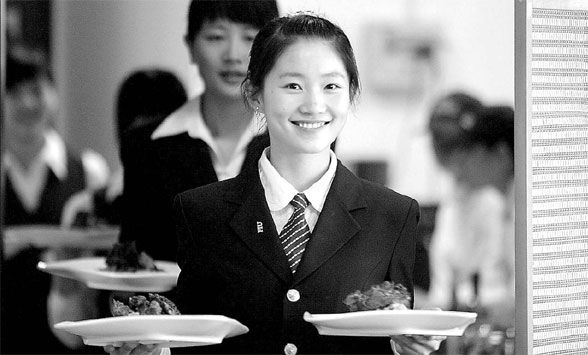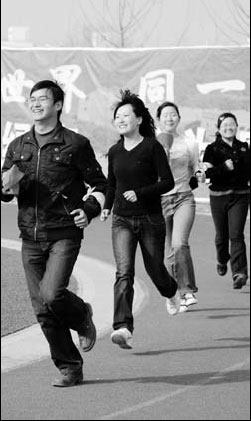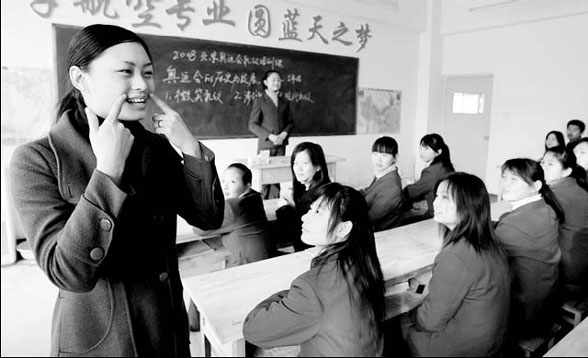More than willing to help
|
Students in a Tianjin university attend a training course about Western food as Olympic volunteers. Li Xiang |
In Sydney, they were at the core of a successful event. In Athens, they helped to create what was hailed as the "Magic Games", showcasing the Greek legacy of humanism. And this year, in Beijing, the invisible legions of volunteers are once again poised to make the Olympics a groundbreaking episode living up to its reputation - a powerful signal of rejuvenation for the host country, its identity, values and sense of achievement.
"It's a great opportunity to show others what China is and to overcome our cultural differences," says Professor Zhao Gang from the Beijing Foreign Studies University, who has been active in the volunteer recruitment and training program. "We'll do what we can to make sure all athletes and visitors enjoy themselves."
Less than 100 days remain till the opening of the Beijing Olympics, when China will make a stand for itself with the international community. The volunteers, with their grassroots support, will be at the forefront of the challenging mixture of Eastern culture and Occidental expectations. And with the two-year registration program closing last month, their Game-time training has entered its final stage.
"I wanted to join since the program was first announced," says Zhang Ang, a first year student from Tsinghua University. "It's an honor to be part of the Olympics and to help with such a great moment for our country."
On April 18, Zhang together with a select group of volunteers got their first taste of Olympic fever. The National Stadium, known as the Bird's Nest, was hosting its opening event, a 20-km race walking challenge and there was a throng of excited spectators to handle.
|
Olympic volunteers being put through fitness training. Xu Yong |
Zhang's team directed traffic to the event and managed the parking lots. It might sound like a banal job, but the competition for it was fierce.
"Over 10,000 people applied for some 700 positions at Tsinghua and I really had to fight to make it," says Zhang laughing.
Most of the Game-time volunteers are recruited from Beijing natives, readily available and familiar with the city. Zhang, an outsider from Henan province, spent his previous summer in special prep classes. He then had to face two interviews and pass exams on Beijing and Olympic knowledge.
"It's worth it, it's great to be part of something so important," says Zhou Yuan, a student at the Information Science and Technology University from Harbin, Northeast China's Heilongjiang province. "People really appreciate your help and it lets us understand more about actual life, unlike when we're holed up in school all the time."
Zhou helps maintain order and manage the audience at the venues, and proficient English was one of the top requirements for her job. In fact the volunteers are to provide assistance in over 50 languages such as Spanish, Russian, Arabic and even Hungarian or Malay.
"I really didn't expect it would be so challenging," says Guo Pengfei, an English major from Beijing Language and Culture University. "Suddenly I realized I'm not just testing myself but representing my country. It really has to be excellent service." Guo is one of the National Olympic Committee (NOC) volunteers, assigned to work directly with the athletes. She will follow a national team through all of its daily activities at the Olympic Village.
"This is once-in-a-lifetime opportunity," she says. "It will be great to work alongside such upbeat, energetic people, in unpredictable situations, when so much is bound to happen."
"I'm still nervous about the language," adds Wen Sujun, another NOC English-language volunteer. "The specialized vocabulary can be daunting, and aside from sport, so many other things need to be taken care of."
The NOC team will also operate an emergency translation hotline, where anyone in need of linguistic assistance will be able to call for help. Their specialized training has only just begun and one can see the weight of expectations bearing down on the group. Some complain about time-consuming meetings and overblown bureaucracy.
"We're not allowed to solve anything but simple problems," explains Guo. "If there is anything serious we'll have to ask the supervisor, and he will most likely have to ask his supervisor, and it might take forever. Will the foreigners understand that?"
Then there are some who gave up on the process.
"Training, exams, exercise, knowledge - I think it's exaggerated," says Yuan Wenwen from Hebei City College. "I signed up with the others two years ago, but now my life is too busy."
Yuan is a fourth year student and like many of her friends she's juggling school with the overwhelming job market. This forced her to be practical.
"Volunteering is everyone's individual choice and it takes sacrifice," agrees Wen Sujun. "But it's also a major life experience."
As the great clocks strewn around Beijing continue their countdown to August 8, many share in the similar sense of anticipation. In addition to the Game-time volunteers, some 400,000 others are working to prepare Beijing for the influx of visitors. For them, it is history in the making.
"We always say how much we love our country, and I think this is the best way to actually show it," says Guo Pengfei. "We might not be able to see many of the events, but we'll experience the other side of the event, the one they don't show on TV."
"Things can be challenging," admits Professor Zhao, "but I think the program is successful and we'll have a good support team. For China, this is a huge event, but above all it serves as expression of happiness and solidarity among all countries."
|
A teacher shows Olympic volunteers how to wear a polite smile during a training course on etiquette. Xue Jun |
(China Daily 05/14/2008 page20)

















